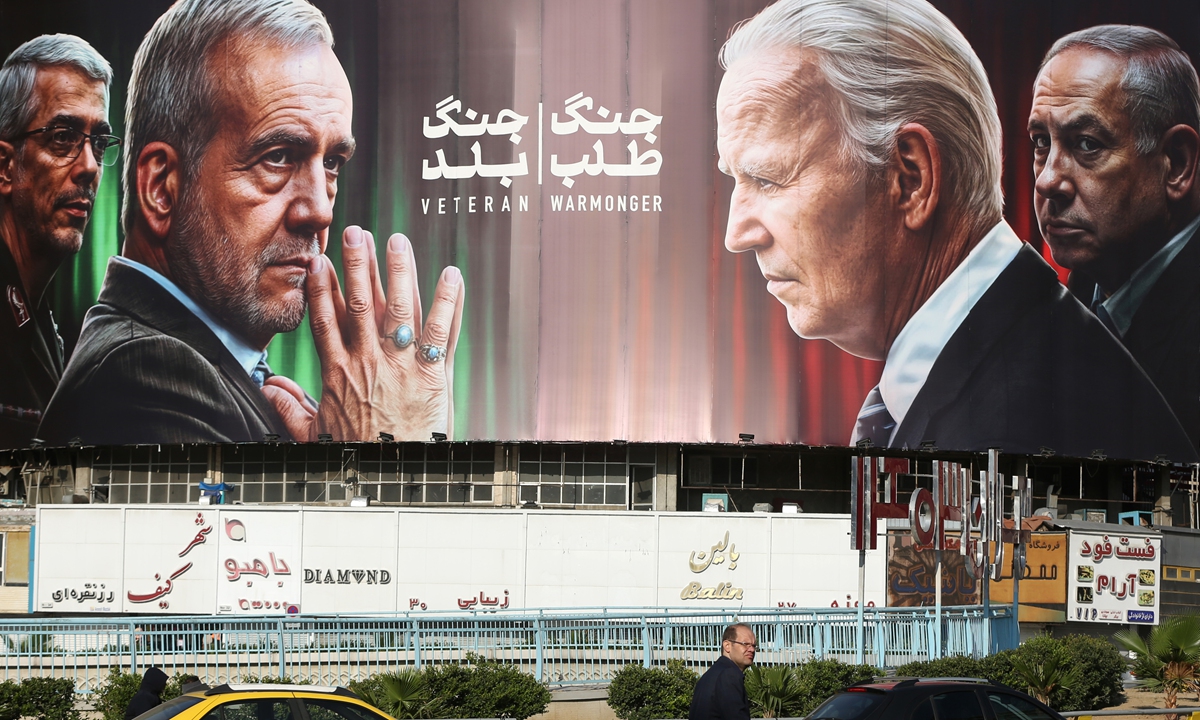
The huge banner with photos of Iranian President Masoud Pezeshkian (second left), Chairman of the Chiefs of Staff of the Iranian Armed Forces Mohammad Baqeri (first left), US President Joe Biden (second right), and Israeli Prime Minister Benjamin Netanyahu (first right) hung in the Iranian capital on October 28, 2024, following the Israeli missile attack on Iran. Photo: VCG
The Chinese Foreign Ministry on Monday expressed opposition to violating the sovereignty and undermining the security of other countries, as well as the abusing of force, when asked to comment on the recent situation in the Middle East, including Israel's attack on Iran on Saturday.
The tensions in the Middle East are running high. Relevant parties need to refrain from further increasing the overall security risks in the region, Chinese Foreign Ministry spokesperson Lin Jian said at a routine press conference, noting that the international community, especially major countries with influence, should take concrete actions to play a constructive role and create necessary conditions for the deescalation of regional tensions.
Iran requested a UN Security Council meeting, claiming that Israel violated international law with its direct strikes against it early Saturday, CNN reported.
According to Islamic Republic News Agency, Iran's President Masoud Pezeshkian said on Sunday that the Islamic Republic does not seek war, but will defend the rights of its people and will give a proportionate response to the latest Israeli aggression against the country.
Iran has sent a signal to the international community that it does not seek war and does not wish to become the focal point of conflicts in the Middle East, Sun Degang, director of the Center for Middle Eastern Studies at Fudan University, told the Global Times on Monday.
However, Iran has also reserved the right to retaliate against Israel, indicating that tensions between the two countries persist, but a large-scale war may be avoided, Sun said.
Sun noted that the US, Israel, and Iran have a tacit understanding that they do not wish for a full-scale war, and neither are they prepared for one. The hardline stances they display are intended for domestic consumption, Sun said.
Echoing Sun, Zhu Weilie, distinguished professor of the Middle East Studies Institute of the Shanghai International Studies University, told the Global Times on Monday that a regional war is a scenario that the US, as well as the regional countries and the global community, wish to avoid. Should a regional conflict erupt at this time, it would be detrimental not only for the nations involved but also for the world as a whole, Zhu said.
According to Reuters, the Swiss UN mission said the Security Council meeting scheduled on Monday had been requested by Iran with the support of Algeria, China and Russia.
The convening of the Security Council is timely, and what may be a matter of urgency is to work to achieve a prolonged ceasefire period, and allow humanitarian supplies to enter the region, Zhu said.
If the Security Council does not press the pause button on the regional situation now, the spillover of ongoing conflicts and mutual misjudgments could occur at any time, Sun said, noting that the international community is in consensus in hoping to use the UN platform to promote a ceasefire and cessation of hostilities in the region.






